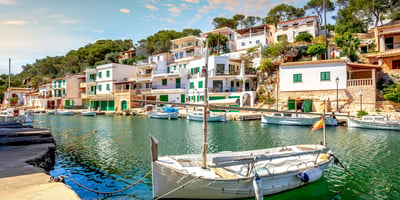You may have been reading a lot of frightening headlines in the British press about the Spanish Government’s plans to prevent non-EU residents from buying property in the country. Added to this, there have been many articles about how Spanish people don’t want tourists and a proposed property tax rise for non-resident buyers.
I have lived in Spain since 2006. I have seen many changes and witnessed the outcome of Catalonia’s declaration of independence in 2017. Today, the main topic of conversation is the lack of affordable housing brought about by the growth of Airbnb-type tourist rentals and, more importantly, greedy landlords. Many are in fact global venture capitalists who own great swathes of residential property throughout Spain.
Should non-EU citizens be concerned?
Probably not in the immediate future. The government’s proposal to ban foreigners from outside the EU from purchasing property has many hurdles to surmount if it is to become law. First, it has to get through the Spanish Parliament. The PSOE party (Spanish Socialist Workers’ Party) is a minority government, relying on small regional parties to give support. Most MPs will be against this proposal as they recognise that the purchase of second homes brings money into the country – not only in buying the property itself but afterwards, using local labour for refurbishment and alterations, local shops for food and household items and local restaurants and bars for meals and tapas.
Then there is the European Parliament which is unlikely to look upon the proposal favourably. Since 1957 when the Treaty of Rome enshrined the principles of what is now the European Union, the right of free movement of people and investment within the members’ countries has been fundamental, whether EU citizens or not. Even if Spain goes ahead, it will be taken to the European Court, as EU laws supersede Spanish laws.
There is no reason why British people and other non-EU residents should shy away from buying property in Spain
For all these reasons, it would take a considerable time for such a proposal to actually come into effect. This means there is no reason why British people and other non-EU citizens should shy away from buying property in Spain. It is still the preferred country for retirement and where young families come to enjoy a better lifestyle. Despite a rise in the cost of living in Spain it is still 35.4% lower than in the UK.

Spain still welcomes foreigners
Other ways Spain is trying to address the housing crisis
As we have seen, an outright ban on non-EU residents buying homes is very unlikely to actually happen, however, the government is looking at other ways to make housing more affordable for its people. One plan is to encourage landlords to offer rentals to young people and families at a lower rent in exchange for maximum tax breaks. This is a practical move, and we could begin to see a turnaround in rental prices.
Many autonomous regions have placed a moratorium on granting new tourist licences for rentals, encouraging visitors to stay in hotels and guesthouses rather than in self-catering apartments. Locals claim that these are greatly responsible for the shortage of affordable housing, as owners can charge more per week than locals pay for one month. The ban on new licences will take time to affect prices though, and for many families, the need for affordable homes is urgent.
We cannot blame local people for feeling angry when hospitality industry workers in some locations had to sleep in vans after work as there was nowhere to rent – not even a single room in an apartment.
So, what about tourists?
It is true that emotions boiled over in a few places in Spain and locals targeted tourists as the cause of the lack of housing. Barcelona, in particular, suffered anti-tourist feeling and demonstrations during the summer of 2024. It isn’t all that surprising, though, as the city welcomes 32 million tourists a year, while the local population is just 1.6 million [1].
Of course, it isn’t the tourist who is to blame, rather the economic and tourist management of the city. But it’s much easier to “attack” the humble tourist than the powers that be. There is, however, evidence that Barcelona’s authorities are taking notice, so perhaps the demonstrations were justified, if unpleasant. One plan is to reduce the number of cruise ships that visit, disgorging up to 5,000 passengers at a time. They generally spend a few hours crowding the city’s main tourist attractions, spend little money and return to the ships for their evening meal.
Barcelona is a great city to live in, evidenced by the large number of foreigners who choose to work there. Unfortunately, though, it doesn’t have the infrastructure to cope with the huge numbers of visitors each year. We can expect more measures to be announced to make life more “liveable” for its inhabitants. Other cities in Spain are also looking at how to balance local life with tourism. This is a work in progress.
Should I consider living in Ibiza?
We have seen the plight of the workers in Ibiza, but it remains a very popular location for property buyers. The climate is ideal, nature surrounds the towns, the beaches are excellent, and sunsets and an easy-going lifestyle all contribute to its attractiveness.
There are direct flights to New York, London and Mallorca, making Ibiza a sought-after destination for remote workers as well as property buyers.
Rents offer a good return, but the number of tourist rentals will be limited in future.
Ibiza is more expensive than some other areas of Spain, partly due to its location and limited supply of property. The higher prices don’t seem to be deterring newcomers, though.
A two-bedroom penthouse in Sant Antoni de Portmany costs €430,000, while a three-bedroom house in the same town costs €665,000. In Santa Eulalia, a three-bedroom apartment close to the beach and town centre costs €685,000 and for villas and fincas the prices run into millions of euros.

Sant Antoni de Portmany, Ibiza (image: valleyboi63 via Shutterstock)
How about moving to Barcelona?
Despite the problems of housing and overcrowding in the city, Barcelona has continued to attract foreigners in IT and other associated industries. Most look for homes outside the city but close enough to get to work easily and there are several districts to tempt.
Sant Cugat del Vallès is one option. It has every amenity you could wish for, is pleasantly quiet, has international and business schools and is fairly close to Barcelona beach. Best of all, it is zone one of the Barcelona metro system.
Another good location is Castelldefels, close to Barcelona Airport and popular with expats of all nationalities. It offers many cultural events, beaches and a good variety of restaurants. It is about 30 minutes from central Barcelona by both car and commuter train.
A two-bedroom apartment in Sant Cugat del Vallès costs €360,000 and a three-bedroom penthouse costs €594,500. A four-bedroom terraced house is around €641,000.
In Castelldefels you can find a four-bedroom apartment in the Montmar district for €380,000 and a four-bedroom detached house for €739,000.
Sources:
[1]: https://www.responsibletravel.com/copy/overtourism-in-barcelona
You might also like:





